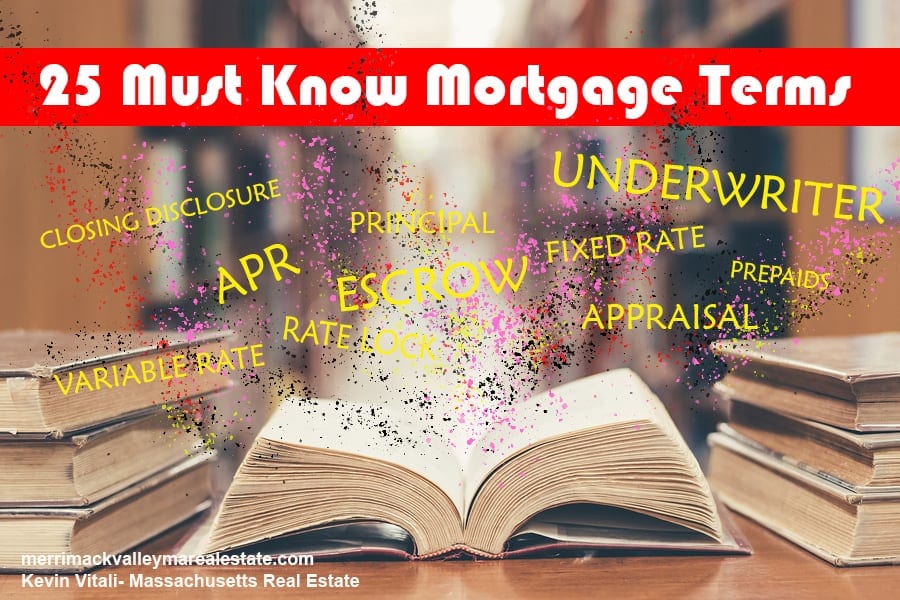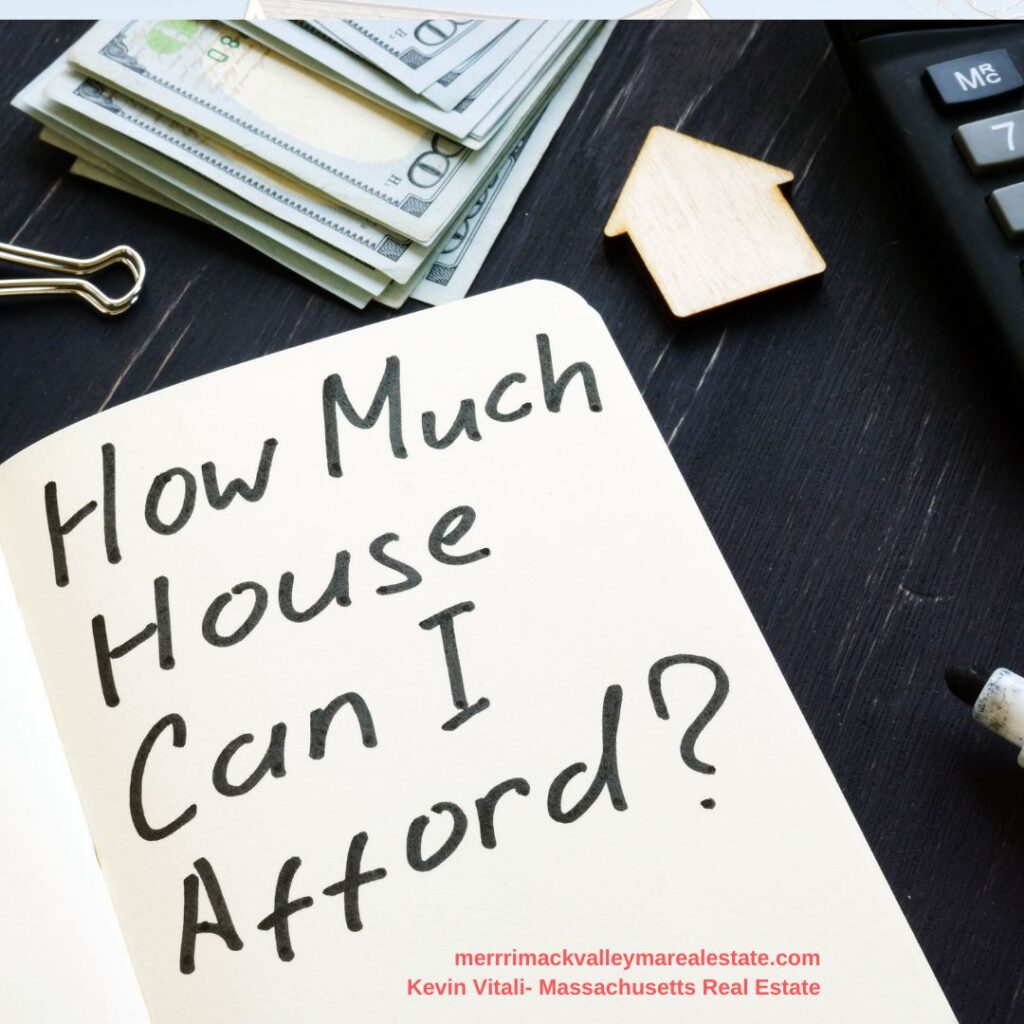 Buying a home is filled with many complexities. One of the more intensive parts of buying a home, whether you are a Massachusetts first-time homebuyer or a seasoned homeowner is securing a mortgage. The process is filled with mortgage terms you may have never heard of before, yet if you want to be fully engaged there are mortgage terms to know when buying a home.
Buying a home is filled with many complexities. One of the more intensive parts of buying a home, whether you are a Massachusetts first-time homebuyer or a seasoned homeowner is securing a mortgage. The process is filled with mortgage terms you may have never heard of before, yet if you want to be fully engaged there are mortgage terms to know when buying a home.
Understanding the mortgage process and the mortgage terms that go along with it will help make a smoother transaction for you.
I have tried to highlight the mortgage definitions that are most important to a home buyer going through the mortgage process.
25 Mortgage Terms To Know As
Amortization
Amortization is the accounting of the payoff of your mortgage over time through a fixed principal and interest payment.
Appraisal
An appraisal is a written estimate of what the home you are about to mortgage is worth. A licensed appraiser performs the appraisal within certain uniform guidelines.
The purpose of the appraisal is to show the bank the property is worth at least the value that is being borrowed.
APR (Annual Percentage Rate)
APR is the true cost of borrowing money. It not only calculates the interest paid over the life of the loan plus the cost of securing the loan. The interest rate only shows the percentage of the principal a lender charges you.
When comparing loan products you should compare APR and not just interest rate, as fees and closing costs can vary drastically from lender to lender.
Clear to Close
A clear to close is when the underwriter has reviewed and approved all the documentation required for your loan program. Once the clear to close is issued the process to fund and close the loan is started.
Closing Costs
Closing Costs for buyers include the hard costs associated with securing a home mortgage. When closing on a loan, your closing costs include the appraisal, origination points, lawyers fees, recording fees, etc… Closing costs are above and beyond your down payment and can run from 2-4% of the loan amount.
Closing Disclosure
The closing disclosure is a document covering the final details of your home mortgage. It provides all of the accounting of your closing costs and your monthly payments.
By federal law, your closing disclosure must be provided to you 3 days in advance of closing. This time allows you to compare it to your previous loan estimate and ask questions of your loan originator.
Debt to Income Ratio
Your debt to income ratio is a major qualifier an underwriter uses to determine your eligibility for a loan program. Simply it is your gross income divided into your monthly consumer debt. Consumer debt being your housing expense, car loans, student loans, minimum credit card payments etc….
Most loan programs will allow a 41-43% debt-to-income ratio but do vary quite a bit from loan program to the loan program. Your debt-to-income ratio is one of the largest qualifiers of how much home you can buy or get a mortgage for.
Equity
Equity is how much of the house you own vs the bank. If you buy a home for $300,000 and put down $15,000 (5%) you have $15,000 dollars equity in your home the day you close. As the market value of your house rises and you pay down the principal your equity stake in your home rises.
The amount of equity you have in your home will affect the loan programs that are available to you as well as your interest rate.
Escrows
Your lender, under most circumstances, is going to insist you fund and maintain an escrow account for your home insurance and property taxes. Your lender will actually be responsible for making the payment…. using your money of course.
Setting up pre-funded escrow accounts and collecting a small amount every month for insurance and taxes ensure the bank the payments will be made in a timely manner. When you pay off your mortgage that money in the escrow account is yours.
Fannie Mae and Freddie Mac
Fannie Mae and Freddie Mac are government-sponsored agencies created to provide affordable mortgages to low-middle-income Americans. They set the guidelines for the conforming loan to be easily bought and sold on the secondary market as well as guaranteeing the loans
Over 90% of the home loans in the US are backed by either Fannie Mae or Freddie Mac.
FICO Score
Your FICO score is your credit score used when securing a mortgage. Specifically, your FICO score is a score designed by Fair Issacson Corporation and is a set of scores from the three major credit bureaus. Your credit score will impact your interest rate more than any single criteria used in determining your eligibility for a loan.
Fixed-Rate
A fixed-rate mortgage is a mortgage rate that is fixed for the life of the loan. Your principal and interest payments will never change over the life of the loan. The most common mortgage product is the 30-year fixed mortgage rate.
Jumbo Loan
A jumbo loan or mortgage is a loan that is outside the lending limits of the Federal Housing Authority. A jumbo mortgage is not eligible to be purchased, securitized or backed by FannieMae or FreddieMac.
Currently, for most of the country, the limit for a conforming loan is $726,200. Any loan amounts exceeding the conforming limit will be a jumbo loan.
Loan Estimate
The loan estimate is a 3-page document that goes over the details of a loan. It covers your loan amount, interest rate and closing costs. By federal law, the Loan Estimate must be provided to you within 3 days of applying for a loan.
Subsequently, any time there is a material change in your loan application that affects the numbers on your loan estimate, you should be provided with a new loan estimate.
Loan Originator
The loan originator, loan officer or mortgage originator is your first point of contact in the home loan process. They will facilitate your loan application and walk you to the closing table. They are your point of customer service with your lender.
Loan Program
Not one size fits all when it comes time to get a home loan. You will hear your loan originator talk about loan programs. Some programs are quite broad and are for very vanilla type loans, or there are much low money down loan programs, down programs, as well as programs that cover special niches.
The loan program your lender chooses, especially as your circumstances become more difficult will make or break you.
Loan to Value Ratio
The loan to value ratio is the amount of money you have put into the deal and how much you are financing. If you are putting 20% that you have an 80% loan to value ratio. Another big qualifying factor to fit you into a loan program.
Pre-paids
Pre-paids are often rolled into closing costs but are not actually the cost of securing the loan. Your pre-paids are items that you pay for in advance. You will have to prepay for one year of homeowners insurance as well as fund an escrow account to pay for your next insurance bill in a year.
The same goes for property taxes. You will always be several months ahead so that when your next property tax bill comes around you have already funded your escrow account to pay for it.
Principal Payment
The amount of payment that is put towards the balance of the loan when you make a mortgage payment. In the beginning, your principal payment will be low and with each month that goes by a little more of your payment goes to the principal.
Private Mortgage Insurance
Private Mortgage Insurance or PMI is an insurance premium you typically pay on loans that have less than a 20% down payment. Private mortgage insurance covers any losses the bank should have if you default on your loan.
Processor
Once you meet with your loan officer and fill out the application and provide the necessary documentation, your loan will be turned over to a processor. The processors job is to package the loan and double check all necessary documentation is provided before it is submitted to underwriting.
You will work closely with the processor until you close on your loan.

Rate Lock
A rate lock is an agreement between you and your lender guaranteeing an interest rate on a specific loan product. Interest rates on loans can fluctuate on a daily basis and until you lock your interest rate, your interest rate is whatever the market rate is for that day.
Typical rate lock periods are between 15 and 90 days. If interest rates rise and your rate is locked you will retain the rate on the day you are locked. Unfortunately, if rates go down, you are stuck with the rate you locked in at. Many banks do allow you to float down the rate for a small fee if rates go lower than the rate you locked.
Title Insurance
Title insurance is an insurance policy you purchase for your bank to cover any losses due to a title defect. If you are borrowing money to purchase a home lender’s title insurance will be mandatory. Optionally, you can also buy owner’s title insurance that will cover any of your losses as well.
Title insurance is a one-time upfront fee when you secure a mortgage.
Variable Rate
Variable rate or adjustable rate mortgages (ARM’s) are mortgage products that are fixed for a certain period and then adjusts yearly based on a specific financial index. The attraction to an adjustable-rate mortgage is the interest rate is lower than the 30-year fixed rate at that time.
Underwriting
Underwriting is one of the most critical pieces of the lending process.
An underwriter is a person who assesses a borrower’s creditworthiness by reviewing credit, income and assets. Specific guidelines will be used for the loan program you are applying for.
Summary of Must Know Mortgage Terms
Your mortgage originator and real estate agent representing you will be a valuable resource when you are buying a home. What can be confusing to you is something they deal with every day and should be able to answer any questions you have quickly.
Being empowered with knowledge in any endeavor in life will certainly help create a positive outcome. This is especially true when you are buying a home and securing a mortgage. Knowing what are some of the more critical mortgage terms can help you during the process.
Other Mortgage Resources:
- Anita Clark Why Do I Need Title Insurance?
- Bill Gassett What Is A VA Loan?
- Paul Sian Alternate Ways to Buy A Home Without A Mortgage
25 Mortgage Terms You Should Know When Buying A Home was provided by Kevin Vitali of EXIT Group One Real Estate. Kevin Vitali is a Tewksbury MA REALTOR® who services northern Middlesex county as well as Essex county in Massachusetts. Are you thinking of listing your Tewksbury MA home or a home in the surrounding communities call Kevin at 978-360-0422




